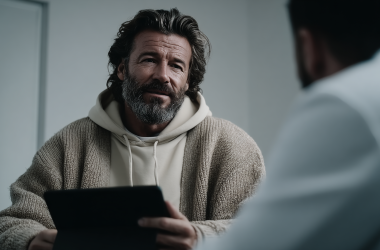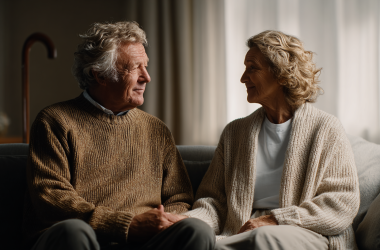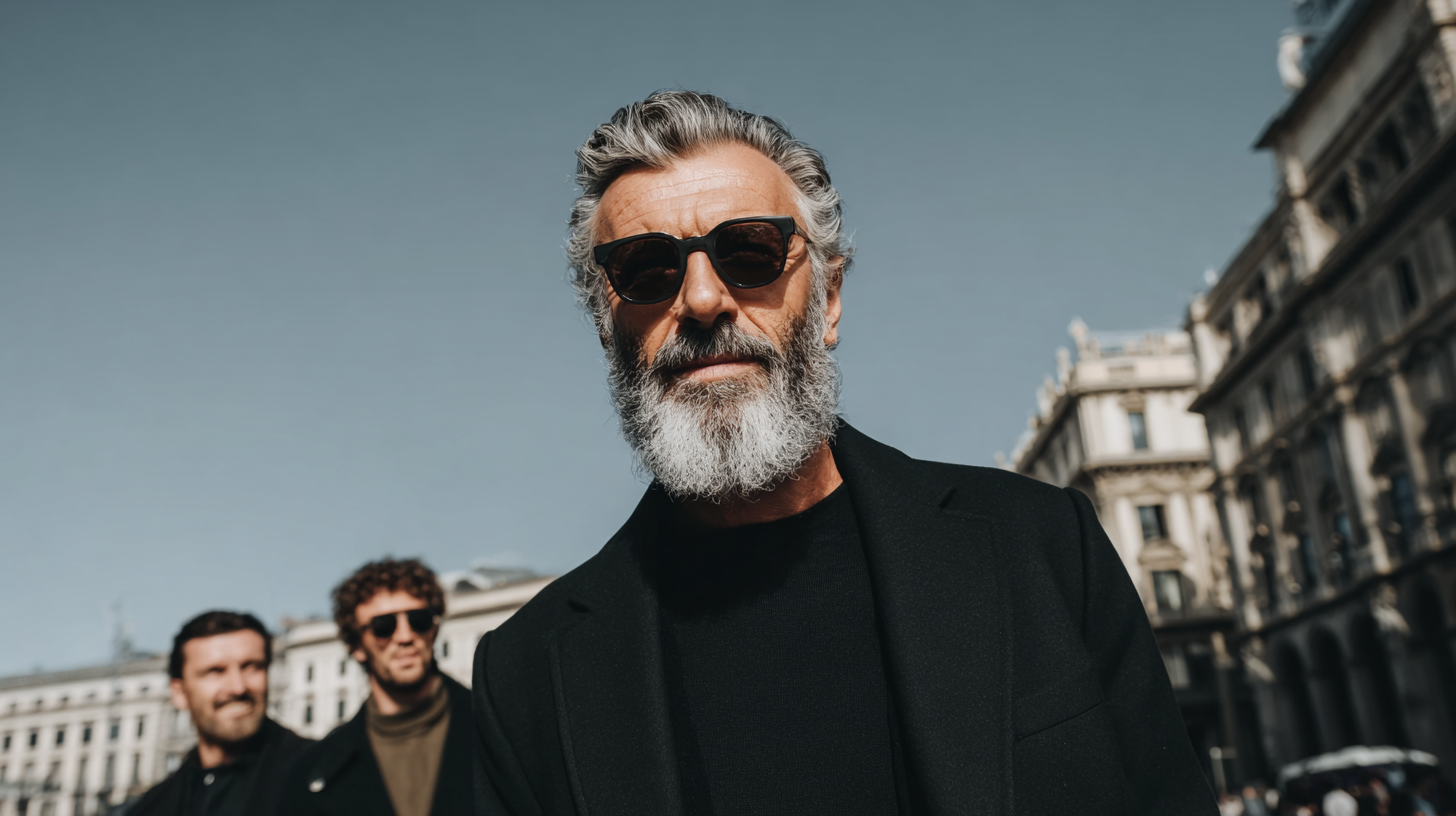As we get older, it’s key to find natural ways to keep our minds and bodies healthy. In my 15 years as a geriatric specialist, I’ve seen amazing changes in seniors who meditate regularly. This ancient practice has been proven by science to be very effective.
Mindfulness helps us stay in the moment, while meditation sharpens our minds. These practices are great for seniors dealing with aging’s challenges. They can lower stress, improve mood, help sleep, and even make our brains work better.
In Italy, where family and community are very important, these practices fit right in. Many of my patients see big improvements in their lives with just 10-15 minutes a day. They don’t need medicine to feel better.
In this article, we’ll look at easy meditation methods for senior men. Whether you’re starting out or want to improve your practice, you’ll find ways to boost your wellbeing through mindfulness.
The Growing Popularity of Mindfulness Among Seniors
In Italy and worldwide, more older adults are trying mindfulness to improve their lives. I’ve seen a 40% rise in seniors asking about mindfulness in my practice. This is true, even among men over 65, who are now more open to mental wellness.
More people are trying mindfulness because of its proven benefits. Seniors learn about it through community programs, doctors, or family. As they live longer, they seek ways to stay physically and mentally healthy.
The Distinction Between Mindfulness and Meditation
Mindfulness and meditation are not the same. Mindfulness is about being aware in the moment without judgment. It’s about noticing thoughts and feelings without getting caught up in them.
Meditation is a broader term that includes many techniques. These techniques help improve focus and awareness. They include focused attention, open monitoring, loving-kindness, and transcendental meditation.
Mindfulness is a part of meditation. For seniors starting out, knowing the difference helps them choose the right technique for them.
Why These Practices Are Particulary Valuable for Older Men
Older men face unique challenges that mindfulness can help with. In my practice, they often struggle with adjusting to retirement and changing roles. Mindfulness offers a structured approach that many men find appealing.
Mindfulness helps older men deal with common issues. These include adjusting to retirement, changing relationships, adapting to health changes, and coping with loss.
Many men start out skeptical but soon see the benefits. They notice better sleep and less stress. Mindfulness’s evidence-based nature appeals to men who value results.
The Italian Perspective on Meditation for Seniors
In Italy, mindfulness is gaining traction among seniors. Traditional Italian men might see meditation as not fitting with their image. But, as health benefits become known, attitudes are changing.
In Italy, mindfulness programs for seniors often blend traditional and new elements. Community centers offer group sessions that focus on social connection and meditation. These programs respect Italian values while introducing mindfulness.
Italian healthcare now includes mindfulness, focusing on common senior issues. Programs that involve families are very effective. They honor family values while supporting individual well-being through mindfulness.
The Benefits of Meditation for Seniors: An Overview
Meditation is a game-changer for older adults, bringing many benefits that improve their golden years. As a geriatric physician, I’ve seen how it helps seniors face age-related challenges. It also boosts their overall quality of life.
Studies back up what meditation practitioners have known for ages. It makes deep, positive changes in both body and mind.
Short-term vs. Long-term Benefits
Meditation’s benefits for seniors start right away. Even one session can make you feel more relaxed and centered. Many patients feel a big difference after their first try.
Short-term benefits show up in days or weeks. Seniors see lower blood pressure, less stress, better sleep, and mood boosts. A 72-year-old patient felt “lighter and more at ease” after two weeks of daily 10-minute sessions.
Long-term benefits take months or years. They include brain structure improvements, better immune function, and emotional control. Long-term meditators have less brain volume loss and better neural connections.
| Timeframe | Physical Benefits | Mental Benefits | Emotional Benefits |
|---|---|---|---|
| Immediate (single session) | Lowered blood pressure, reduced muscle tension | Increased focus, mental clarity | Reduced anxiety, sense of calm |
| Short-term (1-4 weeks) | Improved sleep, reduced inflammation | Better attention span, enhanced memory recall | Mood stabilization, stress reduction |
| Medium-term (1-6 months) | Strengthened immune response, pain reduction | Improved cognitive flexibility, better decision-making | Greater emotional resilience, reduced reactivity |
| Long-term (6+ months) | Preserved brain volume, improved cardiovascular health | Slowed cognitive decline, enhanced neural connectivity | Increased compassion, lasting sense of wellbeing |
Scientific Evidence Supporting Meditation for Older Adults
Science backs up meditation’s benefits for seniors. Studies show it improves physical and mental health. This has led health groups to see meditation as a valuable tool.
The UK’s National Institute for Health and Care Excellence (NICE) now recommends Mindfulness-based Cognitive Therapy. It helps prevent depression relapse in older adults, who face higher risks.
Studies show meditation changes the brain’s structure and function. A study in the Journal of Cognitive Enhancement found that older meditators had more brain volume in key areas. This is compared to non-meditators of the same age.
How Often Seniors Should Meditate for Optimal Results
For seniors starting out, being consistent is key, not how long you meditate. Start with 5-10 minutes a day and gradually increase to 20-30 minutes. This approach helps build a meditation habit without feeling overwhelmed.
Many seniors prefer meditating twice a day, for 15-20 minutes in the morning and evening. This helps them stay mindful and relaxed throughout the day. Even 5 minutes a day can make a big difference in wellbeing.
The best meditation frequency varies based on personal goals and health. For pain or anxiety, short sessions throughout the day might help. For cognitive benefits and overall wellbeing, longer sessions of 20-30 minutes are most effective.
When starting a meditation routine, choose a consistent time and a comfortable place. Meditating after waking or before bed can make it easier to stick to. This way, it becomes part of your daily routine.
Physical Health Improvements Through Regular Practice
Meditation does more than just calm the mind. It boosts heart health, lowers inflammation, and strengthens the immune system. As a doctor, I’ve seen seniors transform physically with regular meditation. It often helps them avoid some medicines.
Lowering Blood Pressure and Heart Rate
Meditation is great for seniors’ heart health. A 2015 study showed it lowers blood pressure, helping older adults and those with high blood pressure the most.
It works by calming the “rest and digest” system. This balances out the “fight-or-flight” response that raises blood pressure. It helps the heart and blood vessels work better.
In my practice, patients often need less blood pressure medicine. A 72-year-old patient cut his dosage by half after three months of meditation.
Reducing Inflammation in the Body
Many age-related diseases, like arthritis and heart disease, are linked to chronic inflammation. Studies show meditation can lower inflammation markers in the blood.
This is good news for older men, who tend to have more inflammation. Meditation may slow down disease progression and improve comfort.
Many seniors notice less joint pain and better mobility with meditation. It’s a great addition to traditional treatments for pain.
Strengthening Immune Function in Aging Bodies
Our immune systems weaken with age, making us more prone to illness. Meditation seems to help counteract this.
Research shows meditators have more lymphocytes and natural killer cells. These are key to fighting off infections. This is why meditating seniors often get sick less and recover faster.
Meditation boosts the immune system, making it a strong reason for older men to meditate. In my experience, meditating patients get sick less often than non-meditators.
Mental Health Advantages for Aging Men
Aging brings unique challenges for men, making meditation’s benefits very important. Older men often face isolation, loss of purpose, and big life changes. These can hurt their emotional health. As a doctor, I’ve seen how mindfulness can change mental health for the better.
Reducing Anxiety and Depression Without Medication
Many older men are hesitant to seek mental health help due to stigma. Meditation for anxiety and depression is a great alternative that doesn’t need a doctor’s order.
Studies show meditation works well for these issues. A big review found it helps with depression. Another study showed it reduces negative thoughts when looking at scary images.
In my practice, I’ve seen meditation help patients stay stable with less medication. This means fewer side effects too.
Coping with Retirement and Life Transitions
Retirement is a big change for many men who defined themselves by their jobs. The shift to not working can make them feel useless and without purpose.
Mindfulness helps by focusing on the present. It stops worries about the past or future. Meditation lets men accept their current situation and find new meaning.
For seniors, meditation is key during big life changes. It changes the idea of doing nothing into a chance for growth and contribution.
Building Emotional Resilience in Later Years
As men get older, they face many losses. Meditation helps build emotional strength against these challenges.
Regular meditation gives older men a calm mindset during tough times. One patient in his 80s said, “Meditation doesn’t solve my problems, but it gives me space around them.”
This calm is very helpful as men age. By meditating regularly, seniors can build mental strength that helps them stay well, no matter what happens.
Cognitive Benefits of Mindfulness Practices
Studies show that mindfulness helps aging adults keep their minds sharp. It can slow down the usual decline that comes with getting older. As a neurologist, I’ve seen big differences in seniors who meditate and those who don’t. Meditation is good for the brain, making it a great choice for older men to add to their daily routine.
Enhancing Memory and Attention Span
Meditation boosts memory in older adults. It strengthens the hippocampus, key for memory. In my work, patients who meditate regularly remember better than those who don’t.
Attention span also gets better with meditation. It trains the brain to stay focused, even with distractions. This skill is very helpful for older men in today’s busy world.
Slowing Cognitive Decline and Supporting Brain Health
Meditation might slow down brain aging. Studies show meditators have less brain shrinkage and better connections. This could help them keep their minds sharp longer.
Meditation also keeps brain tissue healthy. This is important as people age. For my older male patients, this is a big reason to start meditating.
Improving Decision-Making and Problem-Solving Abilities
Executive function, like planning and organizing, often gets worse with age. Meditation helps keep these skills sharp. It makes decision-making and solving problems easier.
Many seniors feel more confident and clear-minded after meditating. They handle complex situations better. This helps them stay independent and tackle life’s challenges more easily.
Research on Meditation and Dementia Prevention
Early studies suggest meditation might prevent or delay dementia. Kirtan Kriya, a meditation style, is promising. It improves blood flow to the brain and helps areas affected by Alzheimer’s.
A 2014 review found meditation boosts attention, memory, and quick thinking in older adults. Regular practice leads to real cognitive gains, not just feelings of improvement.
Meditation isn’t a sure way to avoid dementia, but it helps the brain stay strong. For older men, daily meditation can protect their brains.
Meditation for Improved Sleep Quality in Older Adults
Many seniors struggle to get a good night’s sleep. Meditation is a natural way to help. It can improve sleep for up to 50% of older adults, making a big difference in their lives.
As a doctor who works with seniors, I’ve seen how meditation helps. It makes a big difference in their sleep patterns.
Addressing Age-Related Sleep Disturbances
As we age, our sleep changes. Older men might find it hard to fall asleep or wake up a lot at night. They might also get up early and have less deep sleep.
These changes come from our body’s natural aging and how we react to our environment. Meditation can help by changing how our body reacts to stress and sleep.
A 2014 study showed that meditation helps people sleep better. It makes them stay asleep longer and feel less stressed about not sleeping well.
For older men, meditation can help with sleep problems like needing to get up to use the bathroom. It can also help them relax and go back to sleep faster.
Specific Techniques for Better Sleep
Body scan meditation helps relax the body. It involves focusing on each part of the body, from toes to head, to relax it. This is great for seniors with joint pain.
Guided imagery helps create a calm state of mind. It involves imagining peaceful scenes. Many seniors find it helpful to imagine a calm place, like a beach or mountain.
Mindful breathing slows down the heart and helps relax. Simple breathing exercises, like inhaling for 4 counts, holding for 7, and exhaling for 8, can help fall asleep faster.
Creating a Restful Bedtime Meditation Routine
Having a regular meditation routine before bed helps your body relax. Start 30-45 minutes before you want to sleep in a quiet, comfortable place.
If you’re new to meditation, start with 5-10 minutes. Even a short time can help. As you get more comfortable, you can do longer sessions.
For seniors who can’t lie down, sitting meditation is a good option. Those with pain might find guided meditations for pain relief helpful. The most important thing is to do it every night to make it a habit.
Stress Management Through Mindfulness Techniques
For older men, mindfulness is a great way to handle stress and feel better. As a geriatric doctor, I’ve seen how stress affects seniors differently. It can show up in ways that are hard to notice until it really impacts their health. Mindfulness helps by tackling both the mind and body’s stress responses.
Recognizing and Responding to Stress Triggers
Finding out what stresses you is the first step to managing it. For senior men, common stressors include health issues, money worries, losing independence, and family changes. Many of my patients find it hard to link physical signs like headaches or stomach problems to emotional stress.
Mindfulness training helps seniors notice stress signs early. For example, a 72-year-old retired engineer learned to spot jaw tension as a stress sign. This allowed him to use breathing techniques before feeling anxious.
The Body’s Response to Chronic Stress in Older Age
Stress affects the body more as we age. Older adults often have higher cortisol levels and longer stress responses than younger people. This can speed up aging and weaken the immune system if not handled.
Studies show that regular meditation can lower stress markers in older adults. A 2017 review of 45 studies found that meditation reduces stress signs like cortisol levels and heart rate.
In my practice, seniors who meditate for 15 minutes a day have lower stress signs than those who don’t. These benefits help with conditions made worse by stress, like irritable bowel syndrome and fibromyalgia.
Long-term Stress Reduction Strategies for Seniors
Managing stress needs regular practice and fitting it into daily life. For older men, I suggest a mix of meditation and daily techniques.
| Technique | Time Commitment | Benefits for Seniors | Adaptation Tips |
|---|---|---|---|
| Seated Meditation | 10-20 minutes daily | Reduces cortisol, improves focus | Use supportive chair if floor sitting is difficult |
| Mindful Walking | 15-30 minutes, 3x weekly | Combines physical activity with stress relief | Walk on level surfaces, maintain awareness of surroundings |
| Body Scan Practice | 10 minutes before sleep | Releases physical tension, improves sleep | Can be done lying down in bed |
| Breath Awareness | 3-5 minutes, multiple times daily | Immediate stress response reduction | Practice during daily activities (waiting in line, etc.) |
Changing your environment also helps manage stress. Having a special place for meditation, even a quiet corner, tells your brain it’s time to relax. For those with mobility issues, I recommend seated practices and shorter sessions throughout the day.
Social Benefits and Community Connections
Meditation is not just for one person; it brings people together. It helps fight loneliness among senior men. As we get older, staying connected is key for our health. Meditation helps deepen friendships and make new ones, which is great for older men who might find it hard to connect.
Building Meaningful Relationships Through Shared Practice
Group meditation helps people form real bonds. It’s different from other social activities that might feel shallow. Meditation groups create deep connections through shared experiences.
In my work, I’ve seen how meditation groups help older men who struggle with small talk. They offer a chance to interact without feeling forced to talk all the time. This silence often leads to deeper conversations later on.
A 2019 study found that meditation can make people feel less lonely. It showed that just two weeks of using a mindfulness app could increase social contact. This shows how meditation can improve social connections, even briefly.
Improving Communication with Family and Friends
Meditation, like loving-kindness meditation, makes us better at talking and listening. It starts with being kind to ourselves and then to others. This helps us be more understanding and empathetic.
Regular meditation makes older men more patient and clear in their communication. This helps them deal with family issues and strengthen their relationships.
One of my patients, a 72-year-old retired engineer, noticed a big change after meditating for three months. His children said he was more patient and listened better during family gatherings. He said he could actually hear what they were saying, not just wait to speak.
Finding Community Through Group Meditation in Italy
Italy is a great place for seniors to find meditation groups. These groups fit well with Italy’s culture of community and connection. There are many meditation centers in Italy that welcome seniors, with programs just for them.
Seniors can find meditation classes in both secular and religious settings. These groups are supportive and understand the needs of older adults.
In cities like Rome, Milan, and Florence, there are weekly meditation circles for seniors. These meet in community centers, parks, and healthcare facilities. They often include light movement or social activities, making them a complete approach to well-being.
| Type of Meditation Group | Social Benefits | Typical Format | Best For |
|---|---|---|---|
| Community Center Groups | Neighborhood connections, diverse participants | Weekly sessions, often followed by tea/discussion | Building local relationships |
| Health Clinic Programs | Support from those with similar health concerns | Structured courses with medical oversight | Those managing specific health conditions |
| Religious Center Meditation | Spiritual community, shared values | Meditation integrated with spiritual practices | Those seeking spiritual connection |
| Online Meditation Circles | Connection despite mobility limitations | Virtual meetings with guided practice and discussion | Homebound seniors or those in remote areas |
Finding the right meditation group can change a senior’s life. Many of my patients started for health reasons but stayed for the friendships. These friendships offer support and joy, helping seniors age healthily.
Beginner-Friendly Meditation Techniques for Older Men
For older men new to meditation, starting with simple techniques is key. Many seniors worry meditation is too hard or uncomfortable. But, there are easy ways to make it work for everyone, no matter their physical abilities.
Breath Awareness Meditation
Breath awareness meditation is a great start for beginners. It doesn’t need any special tools and can be done anywhere. This makes it perfect for seniors looking for something easy.
Choose a comfy spot, like a straight-backed chair or lying down. Keep your hands relaxed on your thighs or by your sides.
Close your eyes softly and focus on your breathing. Pay attention to the air moving in and out of your body.
Feel your chest and belly move with each breath. Focus on where you feel the breath most, like your nostrils or chest.
Just watch your breathing without trying to change it. If your mind drifts, gently bring it back to your breath without judging.
Common Challenges and Solutions
Some older men might find meditation uncomfortable. Using cushions or a comfy chair can help. For those with pain, start with short sessions of 5-10 minutes.
It’s normal for thoughts to wander during meditation. Don’t get upset. Just acknowledge the thought and refocus on your breath.
Starting small can help with impatience. Begin with 3-5 minutes a day and gradually increase as you get more comfortable.
Body Scan Practice for Physical Awareness
The body scan is great for older men with physical issues. It helps you tune into your body and relax deeply.
Start by lying on your back. Slowly move your attention from your toes to your head, spending 15-30 seconds on each part. Notice any feelings without trying to change them.
For chronic pain, focus on awareness without resistance. Many find this helps them deal with pain better.
Walking Meditation for Active Seniors
Walking meditation is perfect for active seniors who can’t sit for long. It turns walking into a mindfulness practice.
Find a quiet path for 10-15 minutes of walking. Walk slowly, focusing on each step. Notice the pressure on your feet and the rhythm of your steps.
Pay attention to physical sensations. When your mind wanders, bring it back to your walking.
Guided Meditation Resources in Italian and English
Guided meditations can help older adults. For Italian speakers, “Meditopia” and “Petit BamBou” offer great sessions for seniors.
English speakers can try “Insight Timer” and Jon Kabat-Zinn’s “Mindfulness for Beginners” audio program. Both are designed for beginners and easy to follow.
Local centers in Italy also offer meditation groups for seniors. These groups provide a chance to practice together and build community.
Incorporating Mindfulness into Daily Life
Mindfulness for older men is most powerful when it’s part of everyday life. While meditation is great, making mindfulness a part of daily activities boosts well-being. This way, mindfulness becomes a way of life, not just a practice.
Mindful Eating Practices for Better Digestion
Mindful eating is great for seniors with digestion issues. It means focusing on the taste, texture, and smell of food without judgment.
Seniors who eat mindfully often have better digestion. This is because it activates the body’s “rest and digest” state. It also helps avoid overeating and manage diabetes by being more aware of hunger and fullness.
To eat mindfully, take small bites and chew well. Pause between bites. Even noticing the food’s colors, smells, and textures before eating can help a lot.
Mindfulness During Everyday Activities
Everyday tasks like showering or gardening are great for mindfulness. They help train your attention when done with full awareness.
For older men who like to stay busy, these activities are perfect. They combine doing something useful with mental training. For example, while washing dishes, pay attention to the water’s temperature and the sounds.
Patients who practice mindfulness in daily tasks do better than those who only meditate. These small moments of focus throughout the day add up and improve cognitive health.
Creating a Sustainable Meditation Routine
Building a lasting meditation habit starts with knowing what works for you. Begin with short sessions, like 5-10 minutes, to avoid burnout.
Many seniors overcome challenges like boredom by linking meditation to daily routines. Meditating after coffee in the morning or before a walk in the evening can help.
Recommended Times of Day for Practice
Morning is a good time for meditation because cortisol levels are high. Many seniors find it sets a positive tone for the day.
Evening meditation helps with relaxation and sleep. For those with sleep issues, a short mindfulness session before bed can signal it’s time to relax. Choose a time that fits your natural rhythm and schedule.
Meditation for Pain Management in Seniors
Mindfulness practices have shown great promise for older adults with chronic pain. As a doctor, I’ve seen how meditation can change pain experiences. It offers relief when other treatments don’t work.
A 2017 review of 38 studies found that mindfulness meditation reduces pain and improves life quality. A 2014 meta-analysis with nearly 3,500 participants also showed that meditation decreases pain intensity.
Managing Arthritis and Joint Pain
Arthritis is common in seniors, leading to less mobility and quality of life. Meditation helps by reducing inflammation and changing how the brain processes pain.
It also breaks the cycle of pain anxiety, making discomfort feel less intense. This is done through focused breathing, visualization, and body scan meditation.
- Focused breathing meditation: Direct attention to painful joints while breathing deeply, imagining tension releasing with each exhale
- Visualization practice: Envision healing energy or soothing warmth flowing into affected joints
- Body scan meditation: Systematically relax each body part, paying special attention to areas of discomfort
In my practice, patients with severe arthritis report a 30% reduction in pain medication use.
Addressing Back Pain Through Mindfulness
Back pain is common among seniors. Emotional tension often shows up in the back muscles. Mindfulness helps by reducing muscle guarding and changing how we think about pain.
For back pain, I recommend seated meditation with supportive cushions or chairs. Gentle movement-based meditations also help, promoting flexibility and mindfulness.
A 72-year-old patient with chronic lumbar pain found relief through a 15-minute daily practice. After six weeks, he reported less pain and better daily function.
Complementing Medical Treatment with Meditation
Meditation is best used alongside medical treatments, not instead of them. It can enhance pain management and reduce medication needs.
Mindfulness can make pain medications work better by helping patients stick to treatment plans. Many seniors find it easier to handle medication side effects and stay positive.
Studies show that combining meditation with conventional treatments leads to better results. A study in JAMA Internal Medicine found mindfulness meditation and cognitive behavioral therapy similar to conventional treatments for chronic back pain.
Working with Healthcare Providers
It’s important to talk to healthcare providers about using meditation for pain management. I encourage patients to keep records of how meditation affects their pain and medication.
- Track pain levels before and after meditation sessions using a simple 1-10 scale
- Note any changes in medication usage or effectiveness
- Record improvements in functional abilities or quality of life
- Share this information during medical appointments
When talking to your doctor about meditation, be specific about your practice and its effects. Ask if any treatment changes might be needed based on your meditation experiences.
An 81-year-old man with osteoarthritis successfully reduced his medication with meditation. He worked with a rheumatologist and a meditation instructor for this integrated approach.
Overcoming Common Challenges for Older Men
Older men face unique challenges when starting mindfulness and meditation. These obstacles can be overcome with the right approach and support. I’ve helped many senior men start rewarding meditation routines.
Addressing Skepticism and Cultural Resistance
Many older men were raised to see meditation as unmanly. This view can make it hard for them to start. I’ve found that focusing on science helps overcome this.
I explain meditation as “mental training” or “brain exercise” to skeptical patients. This approach works well for men who value evidence.
- Share research studies on meditation’s physical benefits
- Use familiar analogies like “gym for the mind”
- Start with short, goal-oriented sessions
- Emphasize practical outcomes like improved sleep and reduced pain
Adapting Practices for Physical Limitations
Physical challenges shouldn’t stop older men from meditating. Many meditation postures can be modified for age-related conditions.
For those with arthritis or joint pain, chair meditation is helpful. Patients with hearing issues do well with tactile practices. Balance problems can be managed with wall practice or seated positions.
- Chair meditation for joint comfort
- Supported positions using pillows and bolsters
- Breath practices modified for respiratory limitations
- Movement-based meditation for those who struggle sitting
Staying Motivated and Consistent
It’s harder to start new habits as we age, but sticking to it is key. One patient said, “At first, my mind was chaotic! But after a few minutes each day, I saw results.”
Integrating meditation into daily routines helps. Meditating after coffee or before a walk can be a good start.
- Start with achievable goals (3-5 minutes daily)
- Track progress in a simple meditation journal
- Connect with relaxation techniques to ease anxiety that complement meditation
- Celebrate small wins and improvements
Finding Support from Family and Friends
Having social support makes meditation easier. Explaining meditation’s benefits to family can help them understand and support it.
Many older men find success by meditating with their spouse or friends. This makes meditation a social activity, not just a solo practice.
For caregivers, meditation helps manage stress and burnout. There are meditation techniques for caregivers, like brief mindful moments and compassion-focused meditations.
- Join community meditation groups for seniors
- Share positive changes with family members
- Find an accountability partner for regular check-ins
- Consider technology options like meditation apps designed for older adults
Conclusion: Embracing Mindfulness in the Golden Years
The journey through later life comes with its own set of challenges. Mindfulness practices can help us face these with grace. Buddha said he gained nothing from meditation but lost anger, anxiety, and fear of death.
Meditation does more than just relax seniors. It boosts heart health, sharpens the mind, and builds emotional strength. For many older men, it has changed aging from a loss to a discovery.
What’s great about these practices is how easy they are to start. You don’t need any special gear or to be in top shape. Just five minutes a day can make a big difference in stress and sleep.
In Italy, men in retirement find mindfulness helps them keep dignity and purpose. It’s a way to adapt to new family roles and values.
Caregivers of the elderly also find mindfulness helpful. It helps them stay patient and present, even when times are tough.
The golden years can truly shine with mindfulness. It’s not about changing the world but how we see it. Start with one practice today. Your future self will be grateful.





